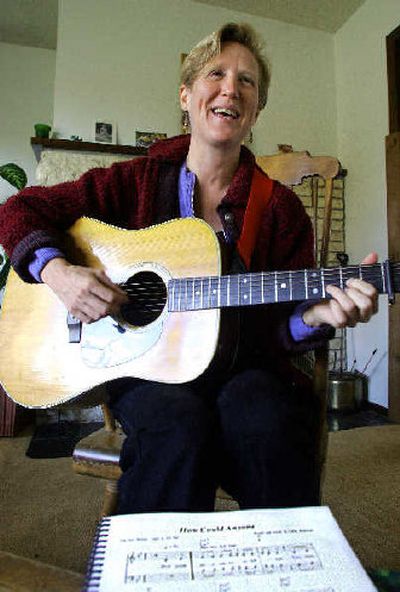Global song

Libby Roderick never set out to write a song heard round the world. But “How Could Anyone,” the simple folk tune she composed in response to a friend in pain, has been embraced by a global audience ranging from prisoners to politicians.
It has been sung by participants at a China women’s conference, by monks and AIDS orphans in Zambia, and in Spanish by Texas nuns.
The lyrics have been reprinted in a Japanese book helping people recover from eating disorders. It’s been translated into Yupik Eskimo at a sexual assault prevention workshop in Alaska and used in a U.S. presidential campaign.
“It’s like you have a child who goes out into the world, and you hear all these great stories about them,” said the 46-year-old singer-songwriter, sipping tea in her Anchorage, Alaska, home.
“It’s not about me. It’s about this phenomenon, and I’m just the vessel.”
The song is short, more of a chorus really – it took Roderick only five minutes to compose – asking how cruelty can exist amid the miracle of humanity:
“How could anyone ever tell you you were anything less than beautiful?
How could anyone ever tell you you were less than whole?
How could anyone fail to notice that your loving is a miracle?
How deeply you’re connected to my soul.”
“People are made to feel bad about so much,” Roderick said. “They’re too fat, they’re too thin, too poor, too old, but I think that deep down inside they know they’re better than others may think.
“This song speaks to both of those things at the same time, and I think that’s why it’s touched so many people.”
One of those touched is Vern Herd, who came upon the song in 1990, when he was serving a 27-year sentence in Washington state for a robbery-related murder. The song was foreign to the message he grew up hearing, that he was ugly and stupid and would never amount to anything.
After being released nine years ago Herd became a prison counselor, and he wraps up his workshops on violence alternatives and self-esteem with Roderick’s song.
“People sing along with it. Some people hold back emotionally – being in prison and all, some get choked up, and I’ve seen some flat-out cry,” said Herd, 52.
“For a lot of people, the message helps shake up beliefs about themselves.”
Roderick said the song poured out after she got a phone call in 1988 from a friend going through an emotional, confidence-draining spell. She never intended to be a professional musician, but friends began taking her recordings out of state, and “How Could Anyone” was always the favorite.
“This song has been mistaken as an old Quaker hymn, as an Eastern spiritual tradition,” Roderick said. “It’s been attributed to so many sources. A lot of people think no one wrote it, like it emanated from the folk consciousness.”
Over the years, Roderick has fielded a steady stream of requests from individuals and organizations asking for permission to use her signature song in churches, hospitals, shelters, rallies, weddings and funerals.
More recently, “How Could Anyone” was adopted as the unofficial theme song for supporters of a bill introduced by U.S. Sen. Mark Dayton, D-Minn., to create a federal Department of Peace and Nonviolence. Roderick sang the song at a September campaign conference in Washington, D.C., that also featured singer Judy Collins and news icon Walter Cronkite.
“How Could Anyone” perfectly mirrors the goal of The Peace Alliance, which is spearheading the lobbying effort behind the legislation, said Dot Maver, alliance executive director.
Maver also used the song when she ran the Democratic presidential campaign of Ohio Rep. Dennis Kucinich, who introduced the same legislation in the U.S. House seeking to set up a peace department.
“It speaks to our essential humanity,” Maver said. “It calls for us to be kind, compassionate, wise, and it recognizes our interconnectedness.”